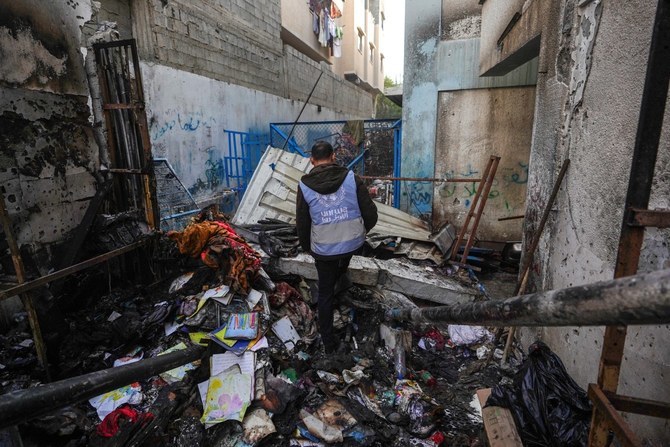LONDON: The UK has approved more than 100 export licenses for the sale of weapons, military equipment, and other items to Israel since the Oct. 7 attack by Hamas militants that killed around 1,200 people, government figures show.
Just over a third of the licenses, 37 of the 108 issued, were described as military, while 63 were declared as non-military, but included telecommunication and software items for use by the Israel Defense Forces.
A further eight open licenses were granted, statistics released by the Department for Business and Trade show.
The data has been released after calls by politicians and campaigners for the British government to be transparent about arms exports to Israel amid what the department called “exceptional parliamentary interest.”
Almost 37,000 Palestinians have been killed and at least 83,530 injured in the Israeli military offensive in Gaza launched in retaliation for the Oct. 7 attack.
Emily Apple, of the Campaign against Arms Trade, slammed the figures for only showing the number of licenses, not the value or the detailed categories of what was exported — data that is normally contained in quarterly arms export licenses statistics, the Guardian reported.
“This data release was supposed to address the political and public interest in arms sales to Israel; the figures released do not do this as they do not give any details of the equipment exported or its value,” she said.
“If and when we have a new Labour government (after a July 4 general election), it is vital that they not only impose an arms embargo but also address the lack of transparency in our export licensing system,” she added.
Approved UK arms exports licenses to Israel were valued at £42 million ($53.4 million) in 2022, with the 2023 figure due to be released later this week.
Campaigners have pressed the British government to end its arms sales to Israel, claiming the exports break international humanitarian law.
Yasmine Ahmed, director at UK Human Rights Watch, said: “The right way to approach Israel’s commitment to comply with international humanitarian law is not by reference to Israel’s subjective interpretation of its compliance with IHL, but by an objective interpretation of what IHL actually requires.”
Her concerns were echoed by Sacha Deshmukh, CEO of Amnesty International UK, who said: “We’re supporting this important case because of the UK’s refusal to abide by its international legal obligations and suspend arms transfers to Israel.”
Earlier this month it was announced that British government ministers found no reason to end weapons exports to Israel after reviewing the latest three-month period of the Gaza war up to April.
“As required by the UK’s robust arms export control regime, the foreign secretary has now reviewed the most recent advice about the situation in Gaza and Israel’s conduct of their military campaign,” a statement from the UK Foreign Office said.
“The business secretary has therefore decided our position on export licenses remains unchanged. This is consistent with the advice ministers have received. As ever, we will keep the position under review.
“The UK operates a robust and thorough assessment of arms export license applications against the Strategic Export Licensing Criteria. These criteria include that we will not grant an export license if there is a clear risk that the items might be used to commit or facilitate a serious violation of international humanitarian law.”


























